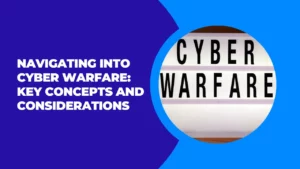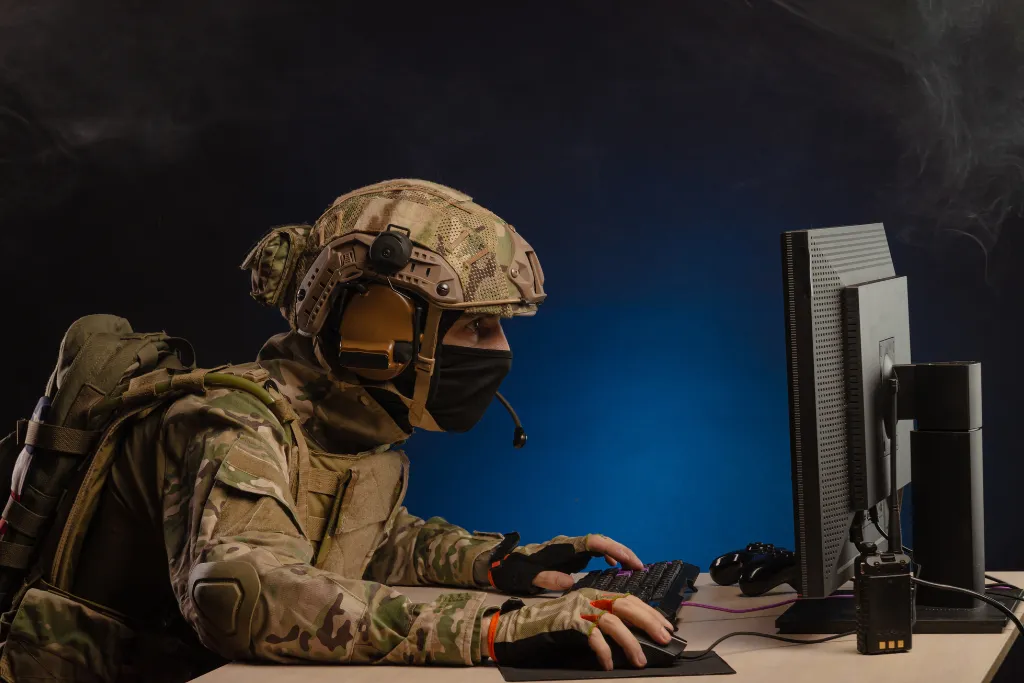Physical Address
304 North Cardinal St.
Dorchester Center, MA 02124
Physical Address
304 North Cardinal St.
Dorchester Center, MA 02124

In today’s world, cyber warfare has become a major concern for governments, corporations, and individuals alike. With its ever-evolving nature and complexity, it can be challenging to keep up with the latest developments and understand the various threats. In this blog post, we will be delving into the world of cyber warfare and exploring its key concepts and considerations.
We will cover everything from defining cyber warfare to understanding the different types of attacks that can occur. We will also discuss how countries navigate this terrain and what steps they are taking to prepare for cyber threats. Furthermore, we will examine the role of the private sector in cyber warfare and provide tips on personal cyber protection.
Finally, we will explore legal perspectives on cyber warfare and how it has influenced popular culture. Read on to gain a deeper understanding of this important topic in today’s digital age.

The world of cyber warfare is a complex and rapidly evolving domain. As technology continues to advance, we have become increasingly reliant on digital systems, making nations vulnerable to a wide range of cyber attacks. The implications of cyber warfare extend beyond national security, posing significant threats to critical infrastructure as well.
Cyber warfare involves sophisticated techniques and strategies, encompassing tactics such as espionage, sabotage, and propaganda attacks. These methods are employed by various actors, including state-sponsored hackers, criminal organizations, and even individual hackers. Recent years have witnessed high-profile cases like the Sony Pictures hack and the malware attacks on Estonia and the NATO network, highlighting the severity of the issue.
To combat the multifaceted nature of cyber warfare, constant vigilance, and adaptive defenses are essential. Governments, telecommunication companies, and organizations like Microsoft have a crucial role in developing cyber defense strategies and implementing robust security measures.
Cyber warfare is not just limited to the digital realm; it can have real-world implications, such as disrupting power grids and other critical operations. Therefore, understanding the complexities of cyber warfare is essential for effectively addressing the challenges it presents.
The realm of cyber warfare involves the strategic use of technology to launch attacks on nations and their assets. This form of warfare takes advantage of vulnerabilities in computer systems and networks, aiming to disrupt, destroy, or gain unauthorized access to sensitive information.
Cyber warfare encompasses various actors, including nation-states, hackers, and other malicious individuals or groups. The consequences are far-reaching, ranging from economic losses to potential loss of life.
Recent years have witnessed numerous high-profile cases of cyber attacks, such as the Sony Pictures hack and the malware attacks on critical operations in Estonia. These incidents have highlighted the real-world impact of cyber warfare on governments, organizations, and even individuals.

In the complex world of cyber warfare, there are various threats that pose significant risks to national security and critical infrastructure. One of these threats is malware, which is malicious software designed to infiltrate systems with the intention of stealing sensitive information or causing harm.
Hacking is another threat in which unauthorized access to computer systems or networks is gained for malicious purposes. Phishing involves using fake emails, websites, or messages to trick individuals into giving away sensitive information. Denial of Service (DoS) attacks overload a system with traffic, making it unavailable for legitimate users.
Lastly, Advanced Persistent Threats (APT) are targeted and prolonged attacks by skilled adversaries seeking unauthorized access to sensitive data.
In the realm of cyber warfare, espionage plays a significant role. It involves the use of hacking techniques to infiltrate systems and steal sensitive information. Both nation-states and non-state actors engage in cyber espionage, driven by motives such as political, economic, or military gain.
The consequences of cyber espionage can be severe, affecting national security, corporate reputation, and individual privacy. To mitigate this risk, defensive measures like firewalls, encryption, and regular security audits are crucial. Additionally, addressing cyber espionage requires international cooperation and diplomatic efforts on a global scale.
By implementing these measures and fostering collaboration, we can combat the rising threat of cyber espionage.
Sabotage is a major concern in cyber warfare, as it can cause serious damage to critical infrastructure and systems. Hackers use a variety of techniques such as malware, denial-of-service attacks, and social engineering to carry out sabotage.
In order to prevent and detect sabotage attempts, businesses and governments must implement robust cybersecurity measures. Additionally, collaboration between different agencies and countries is key for an effective response to cyber warfare attacks.
By understanding the threats posed by cyber warfare and taking the necessary steps to protect against them, organizations can better protect themselves from malicious actors.
Propaganda attacks, a form of psychological warfare utilized by cyber attackers, present an unseen danger in the realm of cyber warfare. These insidious attacks aim to manipulate public opinion and perception, exploiting vulnerabilities in information dissemination channels.
They can take various forms, including the spread of fake news, social media manipulation, and the creation of deepfake videos. The far-reaching impact of propaganda attacks poses significant implications for national security and democratic processes.
To mitigate this risk, organizations must prioritize cybersecurity awareness training for employees and implement robust security measures to safeguard data and critical operations. Collaborative efforts between governments, private sector entities, and civil society are indispensable in combatting the complex challenges posed by propaganda attacks in the ever-evolving cyberspace.

Diving deep into different cyber warfare operations reveals a complex landscape of tactics and motivations. Cyber espionage involves surreptitiously obtaining sensitive information from an adversary’s computer network.
On the other hand, cyber sabotage encompasses deliberate actions aimed at disrupting or destroying an adversary’s computer infrastructure. Cyber terrorism employs technology to cause harm or fear through attacks on critical infrastructure or the general population.
Additionally, cyber crime targets individuals, businesses, or organizations for financial gain, often involving theft of personal information and financial fraud. To defend against such attacks, cyber defense measures must be implemented, including network security, incident response planning, and employee training.
The world of cyber warfare is multifaceted, with these various operations playing significant roles in shaping the landscape.
In the world of cyber warfare, there have been several high-profile cases that provide a closer look at the impact and consequences of such attacks. One notable case is the Stuxnet Virus, which targeted Iran’s nuclear program and is believed to have been carried out by the US and Israel.
Another significant incident is the WannaCry Ransomware Attack, a global cyber assault that affected over 200,000 computers in 150 countries and is attributed to North Korea.
The Russian Election Interference during the 2016 US presidential election, involving hacking and disinformation campaigns, is another example of cyber warfare.
Additionally, the Chinese Hack of OPM compromised the personal data of millions of federal workers, while the NotPetya Attack caused widespread damage and is believed to be the work of Russian hackers.
These cases emphasize the real-world impact and complexity of cyber warfare, highlighting the need for robust defense strategies and international cooperation to combat such threats.
Key motivations behind cyber warfare encompass political, economic, and military factors. Political motivations involve espionage or disrupting a nation’s infrastructure. Economic motivations revolve around stealing valuable intellectual property or financial data.
Military motivations aim to gain strategic advantages or disrupt enemy communication networks.

The rise of cyber warfare presents a significant threat to national security, necessitating an understanding of key concepts such as cyber espionage, cyber terrorism, and cybercrime. Governments, military organizations, and private sectors play crucial roles in defending against cyber attacks, highlighting the need for international cooperation and collaboration to address global threats effectively.
A large-scale cyber attack can have severe consequences, emphasizing the importance of preparedness and response planning. In recent years, notable cyber incidents, including DDoS attacks, malware attacks like the Sony Pictures breach, and state-sponsored attacks like those experienced by Estonia and NATO, have demonstrated the potential impact of cyber warfare on critical operations, telecommunication, and government organizations.
As cyber attacks continue to evolve, it is essential to remain vigilant in protecting valuable information, civil infrastructure, and payment systems from the ever-increasing visibility of cyber threats.
Countries employ various strategies to navigate the complex world of cyber warfare. They collaborate with other governments to share intelligence and resources, establish cybersecurity agencies to monitor and respond to attacks, implement national policies and regulations, and sign international treaties to address cyber warfare challenges.
Nations are taking several steps to prepare for cyber threats. They are investing in cyber defense capabilities, conducting cybersecurity awareness programs for citizens, establishing incident response teams for quick action, gathering and analyzing cyber threat intelligence, and developing offensive cyber capabilities for deterrence.
Private sector organizations are often targeted by cyber attackers, making them a crucial player in the realm of cyber warfare. These companies hold the responsibility of safeguarding critical infrastructure from malicious attacks.
Collaboration between the public and private sectors is paramount in enhancing cyber defense capabilities. The private sector also invests heavily in advanced cybersecurity technologies to protect valuable information and mitigate the financial risks associated with cyber attacks.
Additionally, many organizations opt for cyber insurance to further safeguard themselves against potential breaches. By recognizing the significant role the private sector plays in cybersecurity, we can collectively work towards strengthening our defenses and standing resilient against the ever-evolving threats in the digital landscape.
Companies are increasingly strengthening their cybersecurity posture to defend against cyber threats. Incident response plans are implemented as a precautionary measure to minimize the potential damage caused by cyber attacks. Employee training on cybersecurity best practices is crucial in creating a security-conscious workforce.
Regular vulnerability assessments and penetration testing are conducted to identify and address any weaknesses in the company’s systems. Moreover, information sharing among companies plays a significant role in early threat detection, as it allows for the dissemination of vital intelligence regarding emerging cyber threats.
By prioritizing corporate cyber security, companies can actively contribute to a collective defense strategy against cyber warfare.
Firewalls and intrusion detection systems provide protection against unauthorized access in the private sector. Encryption plays a vital role in safeguarding sensitive data from interception. To enhance the authentication process, multi-factor authentication is implemented.
Regular security audits are conducted to ensure compliance with industry standards, and continuous monitoring for network anomalies helps in detecting potential threats. These cyber security measures are crucial for private sector organizations to secure their valuable information and protect critical operations.
By implementing robust security measures, companies can mitigate the risks posed by cyber attacks and maintain the integrity of their systems and networks. The collaboration between the public and private sectors also strengthens cyber defense capabilities.
To ensure personal cyber protection, there are several necessary steps that individuals should take. Firstly, it is important to use strong and unique passwords for all online accounts to prevent unauthorized access. Additionally, exercising caution when clicking on suspicious links or downloading attachments can help avoid falling victim to phishing or malware attacks.
Keeping software and operating systems up to date with the latest patches is crucial as it helps patch vulnerabilities that cybercriminals may exploit. Enabling firewalls and antivirus software on personal devices adds an extra layer of protection against various types of cyber threats. Lastly, regularly backing up important data is essential to prevent data loss in case of an attack.
By following these steps, individuals can significantly enhance their personal cybersecurity and stay safe in the face of evolving cyber threats.
To protect your devices against cyber warfare, it’s crucial to follow best practices that enhance their security. Start by installing reputable antivirus and anti-malware software. This will help detect and remove any malicious programs that may compromise your device’s integrity.
Additionally, keeping your software and applications updated with security patches is essential to ensure they are equipped with the latest protection against emerging threats. To safeguard your internet access, use secure, encrypted Wi-Fi networks, as this prevents unauthorized individuals from intercepting your online activities.
For an added layer of device security, enable biometric authentication, such as fingerprint or facial recognition. It’s also important to regularly review and adjust privacy settings on your devices and apps to control the visibility of your valuable information. By following these best practices, you can significantly reduce the risk of falling victim to cyber warfare attacks.
Regular software updates are crucial for cyber security as they patch vulnerabilities, fix security flaws, and provide the latest security features. Outdated software can be exploited by cyber attackers, so staying up-to-date protects against emerging threats and reduces the risk of malware infections.
Promoting international cooperation, diplomatic efforts, and the development of cyber norms and rules of engagement can enhance cyber peace. Multilateral agreements addressing cybercrime and espionage, along with strong cybersecurity measures, are crucial for reducing conflicts. Building trust and transparency among nations fosters a peaceful cyber environment.
Successful stories of counterintelligence in cyber warfare demonstrate the power of joint efforts between intelligence agencies in disrupting cyber espionage operations.
These collaborative endeavors have resulted in the identification and dismantling of cyber criminal networks, hindering their ability to carry out malicious activities. By effectively attributing cyber attacks to their perpetrators, consequences for attackers have been enforced, serving as a deterrent for future acts of cyber warfare.
The collaboration between government agencies and the private sector has proven essential in foiling attacks, as they pool their resources and expertise to defend against cyber threats. Additionally, rapid incident response measures have been instrumental in preventing major damage caused by cyber warfare.
These success stories illustrate the importance of proactive counterintelligence strategies in safeguarding critical operations, such as telecommunication networks, power grids, and civil infrastructure, from cyber threats.
The boundaries between traditional warfare and cyber warfare are becoming increasingly blurred, presenting unique legal challenges. International law is struggling to keep up with the rapidly evolving nature of cyber warfare, leaving gaps in legal frameworks and regulations.
Countries like the United States are still in the process of defining the legal framework for responding to cyber attacks. Cyber warfare raises important questions about attribution, proportionality, and the right to self-defense.
The use of cyber weapons has the potential to violate international humanitarian law. These legal perspectives on cyber warfare are crucial as we navigate this complex and ever-changing landscape.
International law does not explicitly recognize cyber warfare as a separate form of conflict. However, existing laws and treaties can be applied to cyber warfare, although they may not fully address its unique characteristics.
The Tallinn Manual provides guidance for applying international law to cyber warfare, but there is ongoing debate about the need for new treaties specifically focused on this issue. The lack of consensus on the legal framework for cyber warfare poses challenges for international cooperation and response.
The influence of cyber warfare on popular culture is evident through its depiction in movies, TV shows, and books. These portrayals often depict high-stakes battles between hackers and government agencies, raising awareness about real-world threats and challenges. However, they can also perpetuate misconceptions about the realities of cyber warfare.
In conclusion, cyber warfare is a complex and evolving landscape that poses significant threats to nations, organizations, and individuals. It encompasses various tactics such as espionage, sabotage, and propaganda attacks, which can have far-reaching consequences.
Governments and private sectors must navigate this terrain by implementing robust cyber security measures and staying updated with the latest technologies and threats. Individuals also play a crucial role in personal cyber protection by following best practices and regularly updating their devices.
Achieving “cyber peace” in this age of cyber warfare requires cooperation between nations, successful counterintelligence efforts, and legal frameworks that recognize and address the challenges posed by cyber warfare. As we continue to navigate the digital age, it is essential to stay informed, vigilant, and proactive in protecting ourselves and our systems from cyber threats.